What’s on
Please note this webpage is no longer updated. Please go to the new website at https://rr.ox.ac.uk/ for the most recent information.
Events
Below is a list of reproducibility-related events happening in or around Oxford. At the bottom of this page you’ll also find some ongoing initiatives, as well as a list of past events. For each of our activities, please follow our Code of Conduct which relies on the UKRN Code of Conduct.
Initiatives
Here is a list of ongoing initiatives related to RROx.
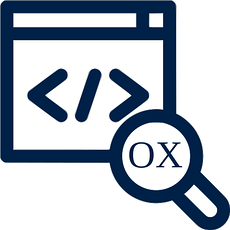
network
Oxford Code Review Network
Ever wanted a fresh pair of eyes to look at your code, or to track down a bug? Would you like to get feedback on your research software from fellow research programmers? Want to get in touch with other research programmers at the University of Oxford?
The Oxford Code Review Network (OxCRN) aims to make it easy for researchers at all levels, from students to senior professors, to engage in regular code reviews, both as reviewers and reviewees. Whatever your research field or favourite programming language, code reviews will make your research software better; not only free of bugs, but also more readable and maintainable, making your research more open and reproducible. It’s also a great opportunity to engage with colleagues from other departments and Divisions!
OxCRN is beginner friendly: you don’t need to be a veteran programmer to review code, and a basic knowledge of the relevant programming language will do. Whatever your level of experience, reviewing code is perhaps the best way to sharpen and widen your software skills.
Simply visit https://github.com/OxfordCodeReviewNet/forum and get started today!

meetups
Oxford Free Open Source Software
Free(Libre) Open Source Software (OxFOSS) meetups are held regularly to discuss free software. Subscribe to the OxFOSS mailing list to stay informed!
This initiative aims to bring together people with an interest in software freedom and open source, particularly in an academic context. Meetings are a mix of informal discussion and invited talks.

training
The Carpentries
Software, data, and library carpentry workshops are organised during the year. Subscribe to the Reproducible Research Oxford mailing list to receive updates on when the next workshop will be held!
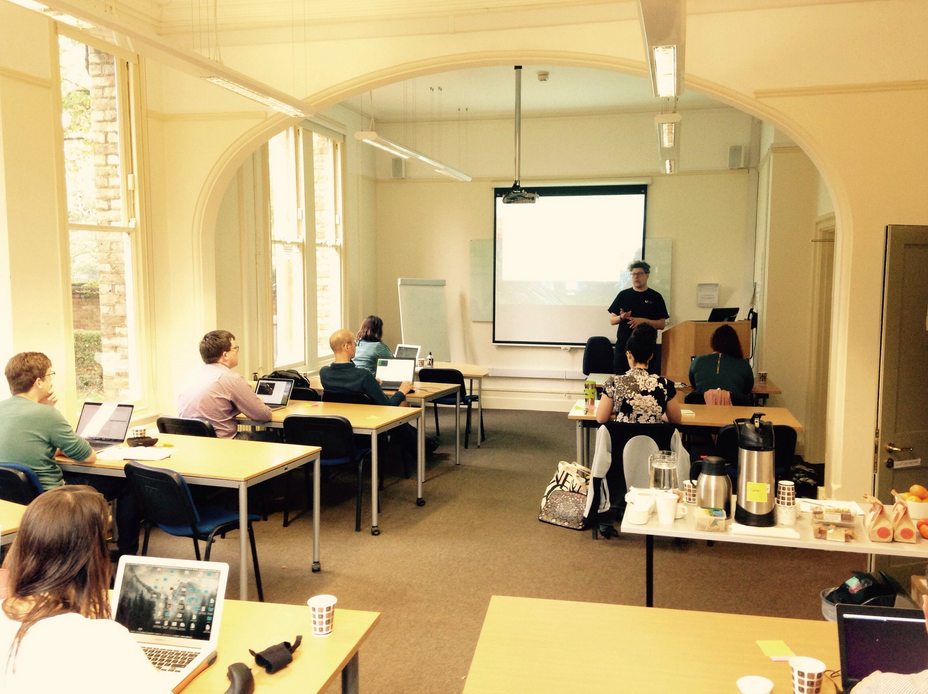

community discussions
RROx community calls
RROx organises termly community call where RROx community members demonstrate a tool, or share their experience on a specific topic, before discussing with participants what the best practices and pain points are when adopting such approach in a research worksflow.
MT 2021: executable manuscript. All demonstrations, notes, and summary can be found here: https://osf.io/prbjm/
HT 2022: Docker, renv, Binder, and other ways to keep track of working environments and packages versions
To know about future meetings and participate in the discussions, sign up to the RROx mailing list. You will receive a Slack joining link in the confirmation email, and you can propose topics for future community calls!

meetups
Decolonising Research Interest Group
The Decolonising Research Interest Group is a fortnightly gathering to discuss and reflect on decolonising methods, and to translate discussions into meaningful action to improve scientific practice.
Subscribe to the Decolonising Research interest Group mailing list!

seminar series
Open Humanities Seminar Series
The Open Humanities seminar series is a monthly event featuring scholars and industry-based researchers who have been contributing extensively to the discussion around Humanities and Open scholarship. Each seminar covers different topics with ample space for discussion, aiming at building a community dedicated to developing and adapting Open Science practices to the specific needs of the Humanities.
Subscribe to the Open Humanities seminar series mailing list to receive the announcements of upcoming sessions!
Programme and information on how to join a specific seminar/webinar can be found on the Open Humanities Seminar Series website:
https://openhumanitiesseminar.github.io/

training
Oxford-Berlin Summer School
After a successful run in person in 2018, and 2019, the Oxford-Berlin Summer School successfully ran online for 2020 and in 2021)! All the materials of the 2021 school (lecture recording and workshop tutorials) can be found on our OSF repository.
Subscribe to the Reproducible Research Oxford mailing list and follow our twitter page for subsequent summer schools!
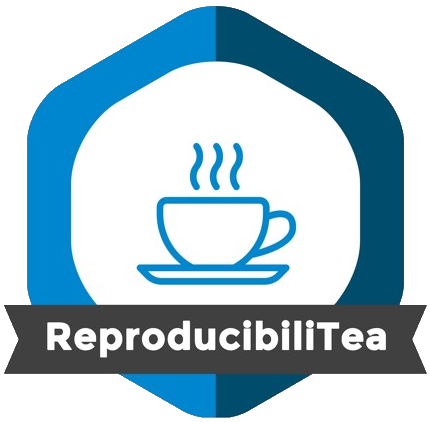
podcast and journal club
ReproducibiliTea
ReproducibiliTea journal clubs are a grassroots initiative for researchers to discuss articles and ideas about improving their work through open research practices.
You can join either or both of the following groups which meet in alternated weeks, by subscribing to their mailing lists:
- clinical-reproducibilitea is co-organised by a team of early career researchers from NDORMS, Primary Care, and Psychiatry. Main contact: James Smith
- reproducibilitea, the funder group, is based in Experimental Psychology. Main contact: Matt Jaquiery
Both groups welcome researchers of all career stages and disciplines.
Follow the twitter page for worlwide updates!
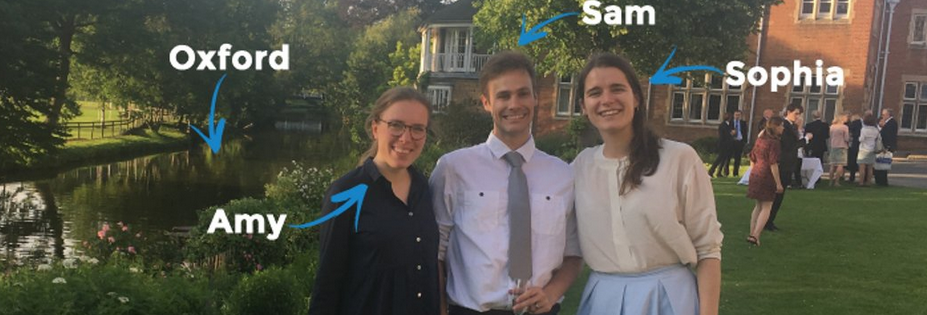
online book club
Statistical rethinking
Statistics book club is an enthusiastic discussion group focused on working through a book or course collaboratively to improve all participants’ statistical knowledge and understanding. The book club meets online on Thursdays from 12.00-13.00 GMT. The schedule is flexibly set as weekly/fortnightly depending on the flow and workload of the chosen book. Newcomers of all abilities are very welcome.
To join the meetings, participate in the discussions, and vote on the next book head to the #statistical_rethinking_bookclub channel on the Reproducible Research Oxford Slack workspace. To join the RROx Slack workspace, sign up to the RROx mailing list and receive a Slack joining link in the confirmation email, or ask the RROx coordinator for a new link!
Past events
2023
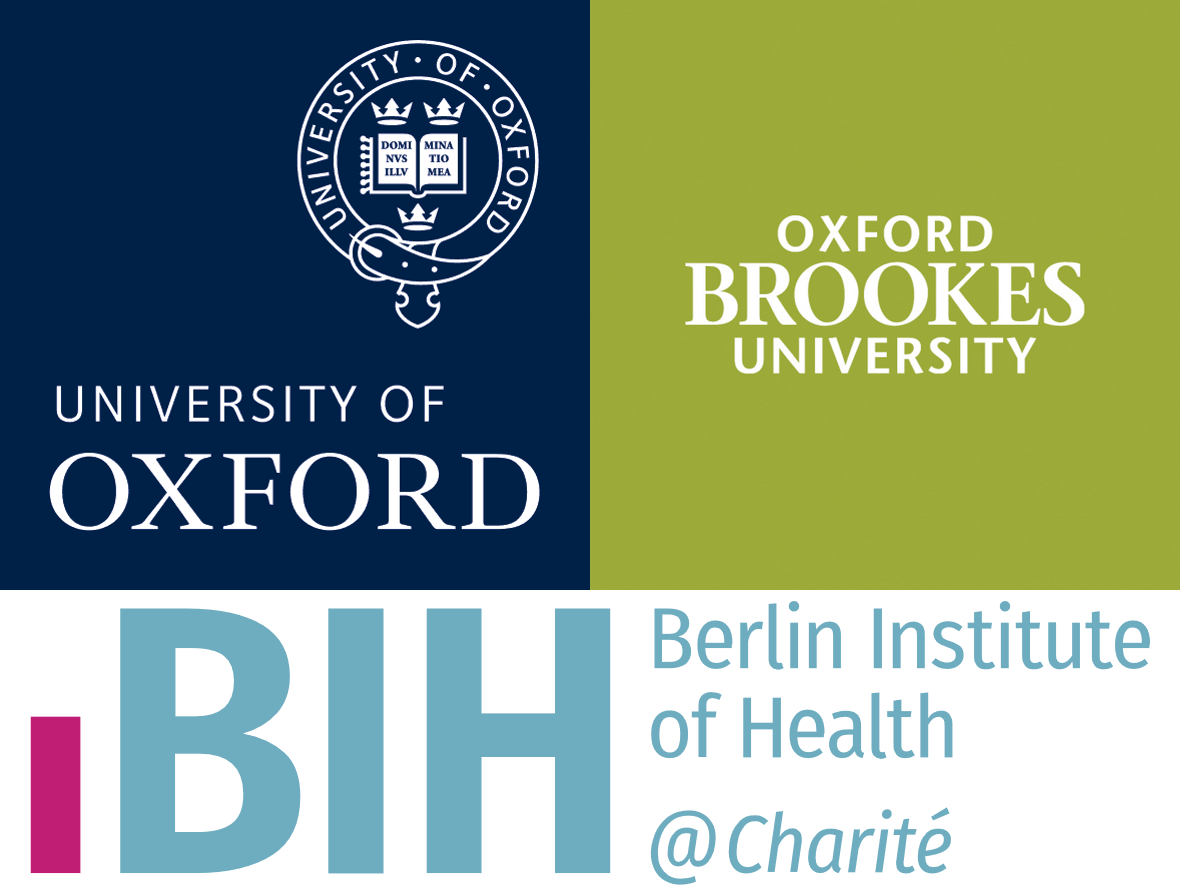
call for application
Oxford | Berlin Autumn School on Open and Responsible Research 2023
Monday 20 November to Friday 24 November, 2023
Register to attend lectures remotely
Background
Transparency and reproducibility of methods and results are important hallmarks of high-quality research in all areas, from biomedical to social and physical sciences, and in the humanities. In the last few years, many novel approaches, tools, and technologies have emerged that allow for a comprehensive representation of the research process that goes far beyond descriptions of research methods and results, as found in traditional journal articles. Open research practices have the potential to revolutionise the way research methods and results are communicated, and to facilitate research collaborations and the sharing of research outputs, and to do so in an unprecedented manner. However, adopting these practices requires knowledge and skills that are not routinely taught either in undergraduate or graduate degrees. To close this gap, we offer a five-day autumn school aimed primarily at advanced doctoral candidates and those in recent receipt of their doctoral degree. Our aim is to help foster an open, transparent, and reproducible research landscape. These topics will be embedded in a more general curriculum on research ethics and meta-research. This year, there will be a special focus on the interface between open research practices and research culture, as well as on leadership in open research practices.
Programme
The five-day autumn school will consist of a series of lectures that cover a range of topics including (amongst others):
-
Biases in research
-
Ideas behind and tools for creating reproducible research pipelines
-
Meta-research
-
Responsible research
-
Leadership and advocacy for open research practices
The lectures will be complemented by a series of interactive workshops. The workshops will expand on the topics covered by the lectures, and there will also be opportunities to shape the structure and content of the workshops to best support participants’ research interests and their needs for current/future research projects. participants can choose from based on their needs (e.g. introduction to R and Python, reproducible workflows, version control in Git and Github, data management, and preregistration).
The full programme will be finalised and shared closer to the date. You can consult previous programmes and materials at the following links:
- 2022 programme (5th Oxford Berlin Summer School)
- 2021 repository (4th Oxford Berlin Summer School)
- 2020 repository (3rd Oxford Berlin Summer School)
Format
The 2023 Autumn school will take place in Oxford, with further details to be shared closer to the start date.
We are adopting a hybrid approach to maximise the autumn school’s reach. All lectures will be live-streamed and available to watch on-demand afterwards. The workshops will be in-person only, and there are a limited number of spaces. Applications are now open to secure a spot (see below).
To promote the adoption of open research practices, we aim to make all training materials freely available to reuse under a Creative Commons license. Further details will be provided in due course.
Register to attend the lectures remotely
Everyone is welcome to register to attend the autumn school lectures remotely. Click here to register.
Apply to attend the Autumn School in person
Applications to attend in-person are now closed, but you may still register to attend lectures remotely
Applicants will be asked to briefly state their motivation (300 words) and to provide the outline of a potential project that is suitable for putting in practice the knowledge and skills acquired at the autumn school. The letter of motivation should contain a brief statement about how the applicant has applied or intends to apply open research practices in their current or future work, if any other related training was attended, and what particular challenges were encountered in their work which would be addressed by the autumn school. The project outline should give a brief overview of future or recently started research projects, in which participants would like to apply open/reproducible research practices. Applicants with projects in any area of research are encouraged to apply.
Selection criteria: We warmly encourage applications from researchers:
(i) working in disciplines traditionally underrepresented in open research practices,
(ii) who identify with groups that have been historically excluded from research (e.g. women, people of colour and/or from ethnic minority backgrounds, people with disabilities, members of the LGBTQ+ community), and/or
(iii) who have followed non-traditional career paths.
If more applications are received than can be accommodated, the organising committee will select participants according to the following criteria:
a) Career stage, motivation, and experience. We will favour applicants who are novices but who have already identified a need for applying the knowledge and skills they will acquire at the autumn school.
b) Representation across disciplines (i.e., balance between disciplines with more established training resources and communities of practice in open research, and disciplines where they are less established).
c) A commitment to diversity, equity, inclusion, and accessibility in the promotion of open research practices, to support the school’s focus on research culture and leadership.
Following acceptance, we will require a signed form from the supervisor/line-manager/Principal Investigator to indicate that they will support the use of transparent and reproducible practices in the applicant’s research project(s).
Costs
The course is free to attend. Lunch and refreshments will be provided to participants free of charge. We have a limited number of travel stipends aimed at participants who would not otherwise be able to afford to attend the autumn school (we endeavour to cover at least 80% of costs). The remaining funds will be allocated on a case-by-case basis. Please indicate whether you would like to apply for such a stipend in your application. You will be asked to provide a brief statement of no more than 100-150 words outlining why you need the stipend and your expected expenses to attend the autumn school. We encourage participants to seek travel funding from their institutions where possible, so as to maximise the number of attendees we are able to support. For Oxford University applicants, we encourage you to discuss attending the autumn school with your supervisor or Principal Investigator in advance, and to seek any funds required from your Department, Division, and/or from your college.
Deadlines for applying to the Autumn school
The first deadline to apply to attend the autumn school in person is the 31st of August 2023. Apply by this date if you wish to be considered for a travel stipend and if you require a visa to travel to the UK.
We will aim to communicate the outcome of stipend applications and those with visa requirements in early September to allow enough time to make travel arrangements. All remaining applications will be considered after the final deadline of the 30th of September 2023. There is no guarantee that any travel funds will be available at this stage. All final decisions will be communicated in early October.
Certificates
In-person participants will receive a certificate of attendance.
Travel and accommodation information
We have a limited number of rooms available for stipend-holders. We advise all other participants to book accommodation early.
Organisers
The autumn school is organised by the University of Oxford in collaboration with the Berlin Institute of Health at Charité (BIH) QUEST Centre for Responsible Research, and Oxford Brookes University.
Funding
The autumn school is generously supported with funds from the Enhancing Research Culture Fund from Research England,the BIH Quest Centre for Responsible Research, and Oxford Brookes University.
2022

presentation and discussion
The ethical challenges of Open Research with Anne Alexander (cancelled in support of strikes)
Anne Alexander, Director of the Learning Programme at Cambridge Digital Humanities, will be presenting a webinar entitled ‘The ethical challenges of Open Research: an interdisciplinary perspective’ on 22 Mar 2022 from 15:00 to 16:00 GMT.
WEBINAR CANCELLED IN SUPPORT OF STRIKES.
Further webinars of the Open Humanities Seminar Series, will be announced on the initiative’s website: https://openhumanitiesseminar.github.io/ and on the Open Humanities seminar series mailing list.

online workshop
Software Carpentry Workshop - Python flavoured
We are running an online Software Carpentry workshop from 15 March 9:45 to 15 march 17:45. This 16 hours workshop will cover the Unix shell, version control in git, and programming in Python. It is free and open to any member of the University – researchers, staff, and students. On this occasion, students from the Faculty of Linguistics, Philology and Phonetics will be admitted preferentially.
Software Carpentry aims to help researchers get their work done in less time and with less pain by teaching them basic research computing skills. This hands-on workshop will cover basic concepts and tools, including program design, version control, data management, and task automation. Participants will be encouraged to help one another and to apply what they have learned to their own research problems.
See the workshop website for more details.
Instructors: Chenzi Xu, Srinivasa Rao, Winnie Smith.
Registration is mandatory, and participation requires setting up the software in advance by following the provided instructions (help desk sessions will also take place the week prior to the workshop).

online survey
Open research at Oxford survey, round two - all researchers
Survey: Open research at Oxford
Calling all Oxford researchers! You are warmly invited to share your views on open research in a survey developed by Reproducible Research Oxford.
Professor Patrick Grant (Pro-Vice-Chancellor, Research) commented: “Research methodologies, the expectations of funders, and the way research is disseminated are changing. This survey aims to reveal how the University can best support researchers to understand, engage with, and lead a shift to more open research. I know researchers receive many survey invitations, but I hope you might find time to respond and help shape the training provision and other support activities across the collegiate University”
The survey is aimed at academics, research staff and fellows, research support staff, and postgraduate research students, based in all academic Divisions of the University (Humanities; Mathematical, Physical, and Life Sciences; Medical Sciences; Social Sciences; Gardens, Libraries and Museums; Continuing Education) and/or in the Colleges. You are encouraged to take part whether or not you are aware of open research practices, and whether or not you deem them relevant or necessary for your field of research.
Participation in the survey is entirely voluntary and anonymous. As a ‘thank you’ for taking part, Reproducible Research Oxford will donate £1 to the University’s Graduate Student Support Fund for each survey submitted (up to a total of £1,500), and you will have the option to enter a raffle for a chance to win one of five £50 gift cards from Bookshop.org.
The survey will remain open until 1 March 2022.
Survey: Open research at Oxford
Reference
Malika Ihle, Dorothy Bishop, & Laura Fortunato. (2021, January 12). Open research at Oxford survey. Zenodo. http://doi.org/10.5281/zenodo.4433688
community call
Community call on reproducible computational environments
Are you using programming languages such as R or Python? Are you sometimes struggling to work on a project and get the same results from a different computer or when working with collaborators? Are you still searching for an optimal way to keep track of your computational environments and packages versions to make your computational environments reproducible?
In this session, we will start with a brief introduction showcasing the benefits of reproducible computational environments and the most commonly used environment manager tools. We will then watch short demonstrations of these different tools from RROx community members and guest, before we discuss pros and cons of each presented tool with all attendees.
28 Feb 2022, 15:00-16:15 GMT, online
Demonstrations (45 min):
- Sarah Gibson – Introduction
- Kevin Rue Albrecht and Matt Jaquiery – Renv (R package to manage R dependencies)
- Charlotte George – Conda (multi-language package manager)
- Martin Robinson – Docker (containerisation of complex environments, captures Operating System itself)
- Sarah Gibson – Binder (automate environment builds and ship environments)
Discussion (30 min)
This session will not be recorded, but all presentations will be prerecorded and made available on the OSF repository prior to the session: https://osf.io/xp9zn/. Auto-captioning will be available in the live session.
To join our community: please subscribe to our RROx mailing list. In your welcome email, you will be invited to our Slack workspace.

presentation and discussion
Data-Driven Hermeneutics with Melodee Beals
Melodee Beals is a Senior Lecturer in Digital History in the School of Social Sciences and Humanities at Loughborough University, UK. She will be presenting a webinar entitled: “Data-Driven Hermeneutics: Historical Judgement in Computer-Aided Research” on 22 Feb 2022 from 15:00 to 16:00 GMT.
On the surface, Big Data seems an obvious and rewarding new frontier for historians, with digitisation offering new insights on a grand scale. However, as an observational rather than experimental discipline, and with datasets particularly prone to unfillable gaps owing to labyrinthine copyright claims and an uneven electronic public domain, data-driven historical research can appear either impossible or thoroughly undesirable. Yet, the sentiments behind open data and methodological reproducibility are part of the very fabric of the humanities, with its tradition of documented hermeneutics and thoroughly provenanced evidence. This talk will discuss the historiographical tradition of reproducibility and how we might build upon these rich traditions in an age of data-driven results.
We hope to have a vibrant discussion afterwards!
Please register to receive the meeting link. This meeting will take place on Zoom with autocaptioning, and will be recorded.
Further webinars of the Open Humanities Seminar Series, will be announced on the initiative’s website: https://openhumanitiesseminar.github.io/
and on the Open Humanities seminar series mailing list.

presentation and discussion
Openness, the Humanities, and the Sciences with Marcel Knoechelmann
Marcel Knoechelmann from the German Centre for Higher Education and Research Studies will be presenting a webinar entitled: “The Role of Culture in Scholarship: Openness, the Humanities, and the Sciences” on 18 Jan 2022 from 15:00 to 16:00 GMT.
We hope to have a vibrant discussion afterwards!
Please register to receive the meeting link. This meeting will take place on Zoom with autocaptioning, and will be recorded.
Further webinars of the Open Humanities Seminar Series, will be announced on the initiative’s website: https://openhumanitiesseminar.github.io/
and on the Open Humanities seminar series mailing list.
2021

online workshop
Software Carpentry Workshop - Python flavoured
We are running an online Software Carpentry workshop from 7 Dec 13:30 to 9 Dec 13:30. This 16 hours workshop will cover the Unix shell, version control in git, and programming in Python. It is free and open to any member of the University – researchers, staff, and students.
Software Carpentry aims to help researchers get their work done in less time and with less pain by teaching them basic research computing skills. This hands-on workshop will cover basic concepts and tools, including program design, version control, data management, and task automation. Participants will be encouraged to help one another and to apply what they have learned to their own research problems.
See the workshop website for more details: https://rroxford.github.io/2021-12-07-oxford-online/
Instructors: Thibault Lestang, Abhishek Dasgupta, Laurence Brown
Registration is mandatory, and participation requires setting up the software in advance by following the provided instructions (help desk sessions will also take place the week prior to the workshop).

community call
Community call on executable manuscripts
Have you heard of executable manuscripts or theses? Are you looking to use R markdown or LaTeX to combine text and statistical outputs? Are you still searching for the optimal way to compile reproducible documents ready for submission?
This community call is primarily designed for researchers who have already attended beginner workshops (e.g. in R markdown or LaTeX) or started to teach themselves the tools needed to create executable/reproducible manuscripts but are still wondering how to combine it all, all the way to submitting a computationally reproducible manuscript.
In this session, we will start with a brief introduction showcasing the benefits of executable research articles and the basic tools that allow us to create them. We will then watch short pre-recorded demonstrations of different workflows from RROx community members. They will share what tools they use and how these tools are combined into a reproducible pipeline to produce PDFs ready for submission. We will then invite attendees to discuss advantages and disadvantages of each workflow presented, and to share their own tips so that we can collectively define a set of best practices when it comes to producing a manuscript. Finally, we will combine information and resources shared by attendees with the accompanying notes from the demonstrators to create a reference sheet for the RROx community. RROx will then work to organise beginners and advanced workshops to teach the skills needed to implement the pipelines considered to be most efficient and reproducible.
This session will not be recorded, but the prerecorded workflow demonstrations of the workflows will be made available on the OSF repository: https://osf.io/prbjm/. As a refresher, you can also find teaching material from the 4th Oxford - Berlin summer school on open research on the OSF repository: https://osf.io/8q59y/. This includes workshop materials introducing R, Python, RMarkdown, LaTeX, and lecture recordings such as ‘How to write readable and sustainable code’.
Monday 8 November 2021, 3pm to 4.30pm, online
Demonstrations (40 min):
- Ilse Pit – Introduction
- Charlie Rahal – workflow 1: (Python + LaTeX + BibTeX) in PyCharm + Overleaf
- Ulrik Lyngs – workflow 2: (R + Rmarkdown + Zotero) in RStudio + Google doc
- Adam Kenny – workflow 3: (R + LaTeX + BibTeX) in Emacs + collaborative editing through version control system
Discussion (20 min)
Hackathon (30 min)
The workflows are presented as: (programming language + markup language + references management) in an integrated development environment (IDE) or a text editor + a way of collaborating.
To join our community: please subscribe to our RROx mailing list. In your welcome email, you will be invited to our Slack workspace.

presentations
Public lectures from the Oxford|Berlin Summer School on Open Research 2021
The Oxford Berlin Summer School on Open Research 2021 will be conducted online on 20.-23. September
The four-day summer school will consist of a series of public lectures complemented by a series of interactive workshops for which applications are closed. Anyone can register to attend the lectures on our eventbrite page.
The full school programme and presentations abstracts can be found on the school website.
Schedule in BST/UTC+1
Monday 20th Sept - Morning Lectures
9.00- 9.45
• Setting the scene: open initiatives in research and scholarship
• Laura Fortunato
10.00-10.45
• Research Ethics & Research Integrity: two duties for researchers
• Tamarinde Haven
11.00-11.45
• How to make your research credible: signposts to workshops
• Malika Ihle
Tuesday 21st Sept - Morning Lectures
9.00- 9.45
• Reducing waste and increasing value in experimental biomedicine
• Uli Dirnagl
10.00-10.45
• FAIR data for humans and machines
• Susanna Sansone
11.00-11.45
• Free code and open data
• Rowan Wilson
Tuesday 21st Sept - **Keynote Lecture**
18:00-19:00
• Research Culture - A Job for Everyone
• Tanita Casci
Wednesday 22nd Sept - Morning Lectures
9.00- 9.45
• Simple techniques for writing readable code
• Thibault Lestang
10.00-10.45
Open access, preprints, and scholarly publishing models
• Ruth Mallalieu
11.00-11.45
• What to expect from replications
• Ulf Toelch
Thursday 23rd September - Morning Lectures
9.00- 9.45
• Using meta-research to improve your science
• Tracey Weissgerber
10.00-10.45
• How bias leads to entrenched errors
• Dorothy Bishop
11.00-11.45
• Global data accessibility
• Louise Bezuidenhout
Organisers
The summer school is organised by the BIH QUEST Center for Transforming Biomedical Research, Berlin Institute of Health and Reproducible Research Oxford, University of Oxford.

presentations
Public lectures from the Oxford|Berlin Summer School on Open Research 2021
The Oxford Berlin Summer School on Open Research 2021 will be conducted online on 20.-23. September
The four-day summer school will consist of a series of public lectures complemented by a series of interactive workshops for which applications are closed. Anyone can register to attend the lectures on our eventbrite page.
The full school programme and presentations abstracts can be found on the school website.
Schedule in BST/UTC+1
Monday 20th Sept - Morning Lectures
9.00- 9.45
• Setting the scene: open initiatives in research and scholarship
• Laura Fortunato
10.00-10.45
• Research Ethics & Research Integrity: two duties for researchers
• Tamarinde Haven
11.00-11.45
• How to make your research credible: signposts to workshops
• Malika Ihle
Tuesday 21st Sept - Morning Lectures
9.00- 9.45
• Reducing waste and increasing value in experimental biomedicine
• Uli Dirnagl
10.00-10.45
• FAIR data for humans and machines
• Susanna Sansone
11.00-11.45
• Free code and open data
• Rowan Wilson
Tuesday 21st Sept - **Keynote Lecture**
18:00-19:00
• Research Culture - A Job for Everyone
• Tanita Casci
Wednesday 22nd Sept - Morning Lectures
9.00- 9.45
• Simple techniques for writing readable code
• Thibault Lestang
10.00-10.45
Open access, preprints, and scholarly publishing models
• Ruth Mallalieu
11.00-11.45
• What to expect from replications
• Ulf Toelch
Thursday 23rd September - Morning Lectures
9.00- 9.45
• Using meta-research to improve your science
• Tracey Weissgerber
10.00-10.45
• How bias leads to entrenched errors
• Dorothy Bishop
11.00-11.45
• Global data accessibility
• Louise Bezuidenhout
Organisers
The summer school is organised by the BIH QUEST Center for Transforming Biomedical Research, Berlin Institute of Health and Reproducible Research Oxford, University of Oxford.

call for application
Oxford|Berlin Summer School on Open Research 2021
The Oxford Berlin Summer School on Open Research 2021 will be conducted in hybrid (or online) format on 20.-23. September
Background
Transparency and reproducibility of research methods and results are important hallmarks of high quality in all areas, from biomedical to social and physical sciences. In the last few years, many novel approaches, tools, and technologies have emerged that allow for a comprehensive representation of the research process that goes far beyond descriptions of research methods and results as found in traditional journal articles. Open research practices have the potential to revolutionise the way research methods and results are communicated, and to facilitate research collaborations and sharing of research outputs in an unprecedented manner. However, adopting these practices requires knowledge and skills that are not normally taught in undergraduate or graduate degrees. To close this gap, we offer a four-day summer school to guide early career researchers (PhD students and postdocs) towards an open, transparent, and reproducible research workflow. These topics will be embedded in a more general curriculum on research ethics and meta-research.
Program
The four-day summer school will consist of a series of lectures that cover the following topics:
- Biases in research
- Reproducibility
- Best practices for sharing publications, data, and code
- Meta-research
- Ethical conduct of research
The lectures will be complemented by a series of interactive workshops, which participants can choose from based on their needs (e.g. introduction to R and Python, reproducible workflows, version control in Git and Github, data management, and preregistration).
Application
Interested participants should apply via our registration page (stored on the Berlin Institute of Health Website). During the registration, they will be asked to briefly state their motivation (300 words) and a description of a potential project that is suitable to apply the knowledge from the summer school. The letter of motivation should contain a brief statement about how the applicant has applied or intends to apply open research practices in their current work, if any other courses were attended, and what particular challenges were encountered in their work, which would be addressed by the summer school. The project outline should give a brief overview of future or recently started research projects, in which participants would like to apply open/ reproducible research practices. Applicants with projects in any area of empirical research are encouraged to apply. If more applications are received than can be accommodated, the organising committee will select participants on the basis of the project and experience that they describe. We will favor applicants who are novices but who have already identified a need for applying the skills acquired. Following acceptance, we require a signed form from the supervisor/PI to indicate that they will support the use of transparent and reproducible practices in the applicant’s research project.
Registration will close on 31 July.
Costs
The course is free to attend.
Venue
If the situation allows, the summer school will be conducted in a hybrid format, that is with local in person meetings organised at Oxford and in Berlin, and with the possibility to attend online. If lockdowns are in place, the summer school will run entirely online.
Organisers
The summer school is organised by the BIH QUEST Center for Transforming Biomedical Research, Berlin Institute of Health and Reproducible Research Oxford, University of Oxford.
Dates
20.-23. September
Additional Funding
“Funded from the Berlin University Alliance as part of the Excellence Strategy of the Federal Government and Countries”
Contact
Please send questions to: malika.ihle@anthro.ox.ac.uk
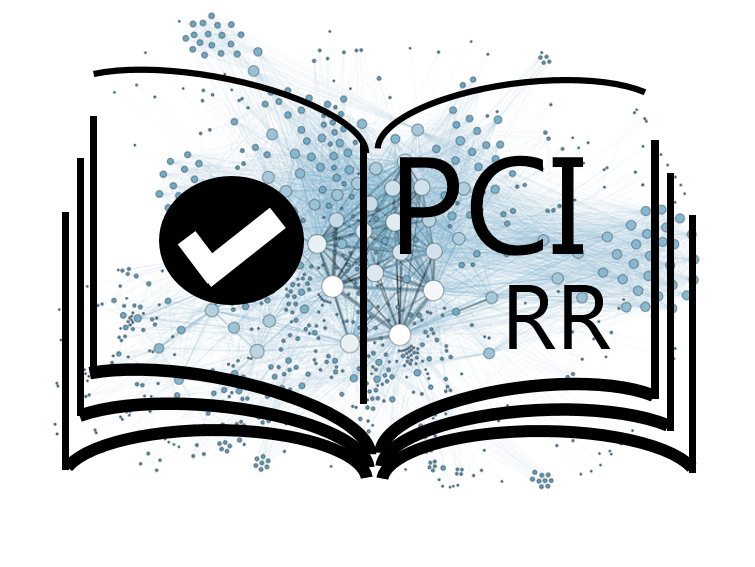
presentation and discussion
Peer Community in Registered Reports with Corina Logan
The video recording and slides for this event can be found on our OSF repository.
Corina Logan from the Max Planck Institute for Evolutionary Anthropology in Leipzig, Germany, will be presenting the initiatives she leads and/or co leads to improve research rigor such as #BulliedIntoBadScience, a campaign where early career researchers are working to change academic culture to adopt open research practices; and Peer Community in Registered Reports, a free, supra-journal platform that reviews & recommends Registered Reports preprints across all research fields (see also this Science news article publicising its launch)
Webinar title: How Peer Community in Registered Reports lets researchers take back control over the publishing process
Abstract: There is a desperate need to reform the production and dissemination of scholarly outputs to increase transparency, reproducibility, timeliness, academic rigor, and equity. I will discuss what researchers are doing to address these issues by sharing ways to tackle biases and facilitate higher quality research that puts researchers back in control using Peer Community in Registered Reports - a free, supra-journal platform that reviews and recommends registered reports across all research fields.
We hope to have a vibrant discussion afterwards!
Date: 28 June 3pm BST
Registration: Please register on eventbrite to receive the meeting link.
This meeting will take place on Zoom and will be recorded.

call for application
The Carpentries instructor training
Are you interested in becoming a certified instructor to teach the computing, software, and data skills that facilitate open and reproducible research?
Through generous funding from Magdalen College, Reproducible Research Oxford (RROx) has established an institutional membership between the University of Oxford and The Carpentries. The Carpentries is a non-profit, community-led organisation, which specialises in teaching Software, Data, or Library skills to researchers across disciplines, in an inclusive environment.
As part of the institutional membership, we are able to offer training for members of the collegiate University to qualify as instructors for The Carpentries. The training involves attendance of a 16-hour online event, followed by a simple check-out process. Certified instructors are then able to help deliver Software, Data, or Library Carpentry workshops, for example by organising an event for their research group or department. We expect newly trained instructors to be involved in delivery of at least one workshop at Oxford within 12 months of completing the training.
We are able to offer a limited number of places on the instructor training free of charge, or subsided, to members of the collegiate University (indicatively, on the order of 10 places free of charge). The UK Reproducibility Network (UKRN) is generously funding up to an additional 6 places free of charge for University members based at Medical Research Council (MRC) Units (one place per Unit).
The cost of one place on the instructor training is estimated at $1,000 (+ 20% VAT). If you wish to secure a place, and you have funding available to cover the cost in full, please contact the RROx Coordinator, Dr Malika Ihle (malika.ihle@anthro.ox.ac.uk), as soon as possible. Similarly, do get in touch if you have funding available for members of your unit to join the training. For example, you or your line manager may have access to a training budget that can be used for this purpose; if you are a student, you may have access to training funds via your programme, College, or Department.
If you have partial funding to cover the cost of the training, or no funding, please read the information below and fill out this application form. If you have any questions, feel free to get in touch with the RROx Coordinator, Dr Malika Ihle (malika.ihle@anthro.ox.ac.uk). And please share widely!
Important dates
Application deadline: 31 March 2021
Applicants notified: review of applications will begin on 15 March, and applicants will be notified by the end of April 2021.
Instructor training: Those offered a place are encouraged to attend the online training as soon as possible, from April 2021. Participation for the whole duration of the training is required. This 16-hour event can take place over 2, 4, or 8 days. Two sessions are provided each month, and new dates are shared every quarter. Please see the training calendar here for upcoming sessions.
Workshop delivery: We expect newly trained instructors to be involved in delivery of at least one Carpentries workshop at Oxford within one year of completing the training.
Eligibility criteria
This call is aimed at postgraduate research students, research staff or fellows, and research support staff from any department, who expect to be based at Oxford at least through the end of September 2022.
Selection criteria
Places funded in full, or subsidised, are limited and they will be allocated in line with the goal to build a sustainable community of instructors based at Oxford. Criteria include:
- career stage, motivations, and experience (i.e. balance between early-career researchers interested in building a community of peers, and permanent University staff already involved in training);
- representation across Divisions (i.e. balance between discipline with high demand for training in computing skills, and disciplines with limited training opportunities in this area);
- previous involvement with Reproducible Research Oxford and/or with The Carpentries (both favoured, but not necessary);
- a commitment to diversity, equity, inclusion, and accessibility, to ensure that all future workshop participants are able to access training in a welcoming environment.
We warmly encourage members of the University who identify with groups that have been historically excluded from computer science and related fields (e.g. women, people of colour and/or from ethnic minority backgrounds, people with disabilities, members of the LGBTQ+ community).
Click here to access the online application form.

online meetups
Online Book and Journal Clubs
To join our community: please subscribe to our RROx mailing list. In your welcome email, you will be invited to our Slack workspace and then you will be able to choose to join any of the public channels described below and to create new ones!
- ReproducibiliTea Journal Clubs
These journal clubs welcome researchers from any career stage and any disciplines to discuss papers and ideas about improving science, reproducibility and the Open Research movement. More details on how to join here.
You can join the chapter organised by the Experimental Psychology team or by the Clinical Research team in alternate weeks. To stay informed about their schedule and meeting links, sign up to the reproducibilitea mailing list and/or the clinical reproducibility mailing list!
You can also continue the discussion over to the dedicated RROx Slack channel for ReproducibiliTea attendees.
- Statistical Rethinking book club
This book club is an enthusiastic discussion group focused on working through a book or course collaboratively to improve all participants’ statistical knowledge and understanding.
This term they will together The Model Thinker by Scott E. Page. and follow the associated Coursera MOOC
To participate in this group and get all the necessary information, join the dedicated RROx Slack channel.
- More to come! And even more if you make a call for a new study group by creating another slack channel!
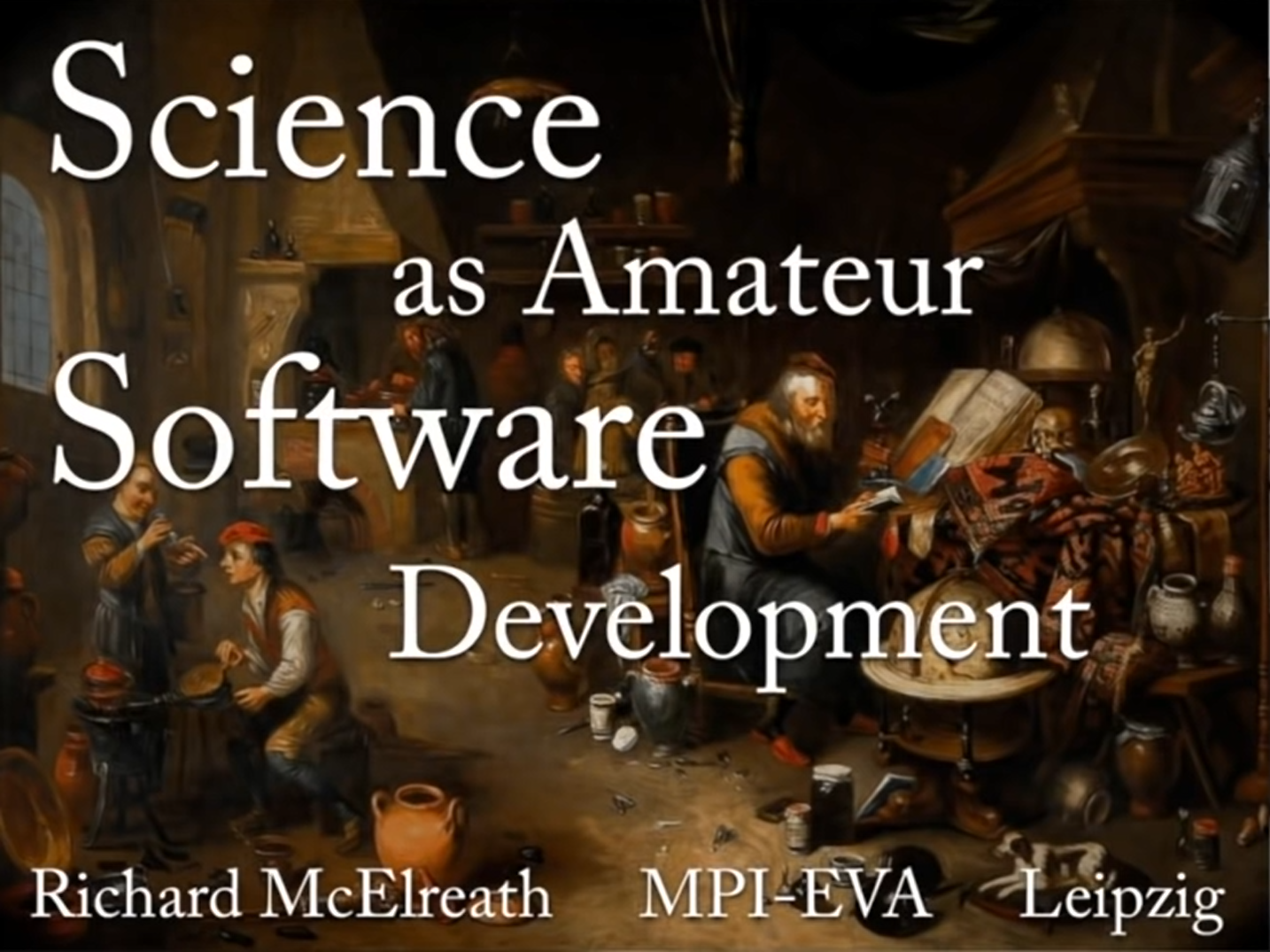
presentation and discussion
Discussion with Prof. Richard McElreath
We are excited to welcome Richard McElreath for a discussion on open research, open source software, and research software development on Monday 8 March, based on his recent lecture ‘Science as Amateur Software Development’. The event will be in two parts; feel free to join one or both!
Guest: Prof. Richard McElreath (Director of the Department of Human Behavior, Ecology and Culture, Max Planck Institute for Evolutionary Anthropology, Leipzig; author of the book Statistical Rethinking: A Bayesian Course with Examples in R and STAN, CRC Press, 2020)
Lecture title: Science as Amateur Software Development (50 min video recording)
14:00-14:50 GMT: join our watch party (bandwidth permitting!) or watch on your own
14:50-15:00 GMT: break
15:00-15:45 GMT: join the discussion, hosted by Dr Laura Fortunato (Institute of Cognitive and Evolutionary Anthropology, University of Oxford; Reproducible Research Oxford lead)
Of course, feel free to watch the recording at a different time that may suit your schedule, and then join us for the discussion on the day!
Please register to receive the Zoom link.
This meeting will have live captioning and will not be recorded.

online survey
Open research at Oxford survey, round one - PGR students
This survey is aimed at academics, research staff and fellows, research support staff, and postgraduate research students, based in all academic Divisions of the University of Oxford (Humanities; Mathematical, Physical, and Life Sciences; Medical Sciences; Social Sciences; Gardens, Libraries and Museums; Continuing Education) and/or in the Colleges. The results of the survey will inform implementation of open research practices and responsible research assessment, and shape related training provision across the collegiate University.
Due to the pandemic, we will administer this survey in two rounds. The first round, from January 2021 to 1st March 2021, is targetting postgraduate research students only.
Survey: Open research at Oxford
You are warmly invited to share your views on open research in a survey developed by Reproducible Research Oxford. Professor Patrick Grant (Pro-Vice-Chancellor Research) commented: “The survey will help to inform our implementation of open research practices across the collegiate University, and to understand what postgraduate researchers want from open research. It is a chance for postgraduate students in all disciplines to shape how research could evolve and how the University could best support them in this transition”.
Your views would be very welcome whether or not you are aware of open research practices, and whether or not you deem them relevant or necessary for your field of research.
Participation in the survey is entirely voluntary and anonymous. As a ‘thank you’ for taking part, Reproducible Research Oxford will donate £1 to the University’s Coronavirus Hardship Fund for each survey submitted (up to a total of £1,500), and you will have the option to enter a raffle for a chance to win one of five £50 gift cards from Blackwell’s. The survey will remain open until 1st March 2021.
Survey: Open research at Oxford
Reference
Malika Ihle, Dorothy Bishop, & Laura Fortunato. (2021, January 12). Open research at Oxford survey. Zenodo. http://doi.org/10.5281/zenodo.4433688
2020

online meetups
Online Study Groups
In the coming months, we will run online study groups.
We continuously collate online training resources (feel free to use, share, and populate), and people among us have volunteered to organise study groups around some of those resources.
To join our community: please subscribe to our RROx mailing list. In your welcome email, you will be invited to our Slack workspace and then you will be able to choose to join any of the public channels described below and to create new ones!
-
ReproducibiliTea organised by the Oxford Experimental Psychology team (welcoming everyone from Oxford and beyond!) is resuming its journal club format and is available every week online! Sign up to the reproducibilitea mailing list or visit the ReproducibiliTea website. You can also continue the discussion over to the dedicated RROx Slack channel for ReproducibiliTea attendees.
-
Oxford Free(Libre) Open Source Software (OxFOSS) meetups is the result of a collaboration between researchers from RROx & Oxford Research Software Engineering (OxRSE) interested in software freedom. OxFOSS will organise informal virtual meetups/lunches to discuss an article or a presentation about current free software practices in academia, tools, ethics, etc. If you are interested, please subscribe to the OxFOSS mailing list!
-
Statistical Rethinking book club is meeting weekly to discuss the book Statistical Rethinking: A Bayesian course by Richard McElreath (available as eBook through the Bodleian with Oxford SSO) and its associated online course recording. To participate in this group and get all the necessary information, join the dedicated RROx Slack channel.
-
Computer Skills book club is meeting every two weeks to discuss the book Computing skills for biologists by Stefano Allesina & Madlen Wilmes (available as eBook through the Bodleian with Oxford SSO) and its associated online exercises. Join the dedicated RROx Slack channel if interested!
-
More to come! And even more if you make a call for a new study group by creating another slack channel!

discussion
Wellcome Cafe Culture
We would like to discuss with you our current research culture and ways to improve it!
We will be hosting a Wellcome Trust Café Culture in St John’s College from 5pm to 6.30pm on the 5th of March (room tbc).
Please sign up on this eventbrite page!
This will be an opportunity to talk about the challenges we face in research culture, reflect on what a better culture would look like, and, most importantly, propose solutions for how Wellcome and other parts of the system could change.
Wellcome’s previous survey and interviews with researchers revealed a lot about our working culture and the kinds of problems we face. Read the findings. Now, we have the chance to play our part and propose solutions!
Before our discussion: Take a particular issue of research culture that you think needs to improve, and think about ideas for how to achieve that. What could individual researchers, research leaders, institutions, funders, professional bodies or others do? How could different kinds of individuals and organisations reward, require and support good practices and behaviours?
Some of the topics involved will touch on deeply personal experiences and may be difficult to discuss. Everyone in the group should be considerate and respectful, and we hope you feel able to speak openly. You might also want to make yourself aware of appropriate sources of support available at your institution.
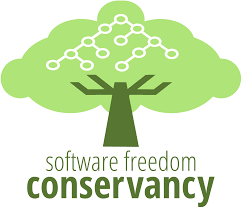
presentation
Karen Sandler from software freedom conservancy
Karen Sandler will be speaking about her work at software freedom conservancy on February 5 at 16:00 (Lecture Theatre B, Department of Computer Science)
Finding Our Path To Digital Autonomy: Exploring the Relationship Between Tech Ethics, Privacy and Software Freedom
We increasingly live in a world where technology is embedded in every aspect of our lives. From medical devices to in-home security systems, to oral medication with sensors embedded, much of our personal information is broadcast out of our control with minimal real security on the devices we use. There’s often no option to even switch off connectivity of our devices and have them remain functional. We are regularly asked to accept terms of service that no reasonable person could read and understand. It’s becoming evident that:
- Medical and other assistive technologies aren’t optional
- It is becoming increasingly expensive to avoid connectivity
- The most vulnerable are the most exploited by tech with terrible privacy and no control
- Current policy does not ensure the existence of any user-respecting alternatives
While many are finally starting to wake up to the problematic state of our technology, the focus has been on merely protecting private information, not appreciable control over our digital destinies. We know that all of the technology we rely on is likely vulnerable, so let’s make sure we’ll be able to fix problems when they arise. Let’s treat users of technology as partners rather than just consumers. This talk will explore the current state of personal technology and the overlapping but separate issues that need to fall into place to assure we have digital autonomy when we need it most.
Karen is the executive director of Conservancy. She is known as a cyborg lawyer for her advocacy for free software, particularly in relation to the software on medical devices. Prior to joining Conservancy, she was executive director of the GNOME Foundation. Before that, she was general counsel of the Software Freedom Law Center. Karen co-organizes Outreachy, the award-winning outreach program for women globally and for people of color who are underrepresented in US tech. Karen is a recipient of the O’Reilly Open Source Award and cohost of the oggcast Free as in Freedom.
Karen received her law degree from Columbia Law School in 2000, where she was a James Kent Scholar and co-founder of the Columbia Science and Technology Law Review. Karen received her bachelor’s degree in engineering from The Cooper Union.

conference
Reproducible Research Oxford Launch
Reproducible Research Oxford (RROx) formal launch event took place on
Monday 13 January 2020 from 1.30-6pm at St John’s College
We published in brief report of the event in Research Fortnight
As well as introducing RROx, and having brainstorming sessions with the audience , we had three invited speakers:
• Claire Fraser (Senior Higher Education Policy Adviser, Research England) he role of open research and responsible research assessment to addressing issues of research integrity
• Stephen Curry (Imperial College London and DORA) Implementing DORA (San Francisco Declaration on Research Assessment)
• Brian Nosek (University of Virginia and Center for Open Science) Shifting incentives from getting it published to getting it right
This event was well attended with over 120 attendees spanning the 4 Divisions of the University of Oxford and including research support staff from the Bodleian Libraries, IT services, and Research Services.
Video recordings and slides for each presentation can be found on our OSF repository.
2019

training
Project TIER Faculty Development Spring '19
Project TIER’s Faculty Development Workshops are designed for college and university faculty who are interested in integrating principles of research transparency and reproducibility into courses on quantitative methods and/or the supervision of student research.
The workshops introduce participants to protocols for conducting and documenting empirical research that ensure the reproducibility of all computational results, and then present a range of pedagogical strategies and curricular resources for teaching these methods to students in a variety of educational settings.
The objective is to help instructors develop plans for teaching reproducible research practices that will be feasible and effective in their particular contexts, so that they are fully prepared to implement the methods presented at the workshops when they return to their home institutions.
Historic events
Other past events can be found on the archive of this website.